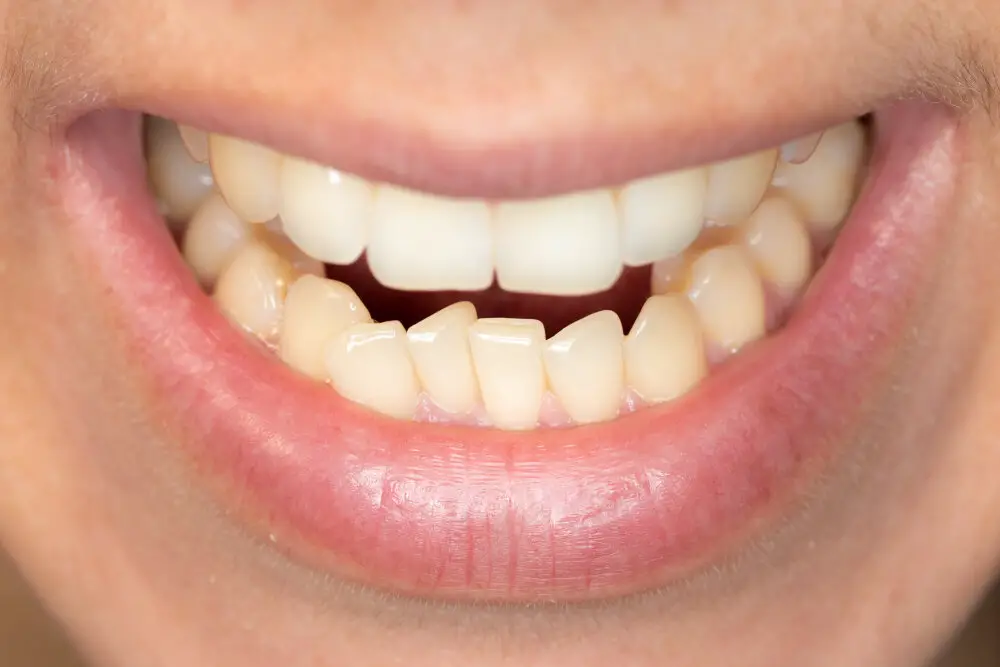Sensitive Teeth Whitening: Tips and Tricks for a Brighter Smile

Sensitive teeth are a common issue that can be caused by a variety of factors, such as gum recession, tooth decay, and enamel erosion. Unfortunately, this can make it challenging for those who suffer from sensitive teeth to achieve a bright, white smile. Traditional teeth whitening methods can often exacerbate the sensitivity, making it a painful process for those who undergo it. However, with the right tips and tricks, sensitive teeth whitening can be done effectively and painlessly, resulting in a brighter smile that you can be proud of. One of the most crucial tips for sensitive teeth whitening is to be gentle with your teeth. This means avoiding harsh chemicals and abrasive toothpaste that can cause further damage to your enamel. Instead, opt for gentler, natural solutions that can help whiten your teeth without causing any pain. Additionally, it’s essential to take good care of your teeth and gums to prevent any further sensitivity from occurring. By following these tips and tricks, you can achieve a brighter, healthier smile that you can show off with confidence.
Why Do Teeth Become Sensitive?

Sensitive teeth can be a nuisance that affects many individuals. It occurs when the enamel on the tooth’s surface is worn down or the gum line has receded, exposing the dentin beneath. The dentin contains tiny tubules that lead to the tooth’s nerve, which can cause pain and discomfort when exposed to hot or cold temperatures, acidic or sweet foods, or even air. Other factors that can contribute to tooth sensitivity include tooth decay, gum disease, teeth grinding or clenching, and certain dental procedures such as teeth whitening. Age can also play a role, as the enamel naturally wears down over time. One of the most common culprits of tooth sensitivity is brushing too hard. This can cause the enamel to wear down and the gum line to recede, exposing the dentin. Using a soft-bristled toothbrush and being gentle when brushing can help prevent this. Additionally, using toothpaste specifically designed for sensitive teeth can help alleviate discomfort. Another way to reduce sensitivity is to avoid acidic foods and drinks, such as citrus fruits and soda, which can erode the enamel. It’s also important to practice good oral hygiene by brushing twice a day, flossing daily, and visiting the dentist regularly for cleanings and checkups. By taking these steps, individuals can help alleviate tooth sensitivity and enjoy a brighter, more comfortable smile.
Tooth sensitivity can be caused by many factors, including gum recession, enamel erosion, tooth decay, and even brushing too aggressively. When the protective layer of enamel on your teeth wears away, it exposes the underlying dentin, which contains microscopic tubules that lead directly to the nerve endings in your teeth. This can cause pain or discomfort when your teeth are exposed to hot or cold temperatures, sweet or sour foods, or even just cold air. Other factors that can contribute to tooth sensitivity include grinding or clenching your teeth, using certain whitening products or mouthwashes, and having a diet that is high in acidic foods or drinks. To prevent or minimize tooth sensitivity, it’s important to practice good oral hygiene, avoid acidic foods and drinks, use a soft-bristled toothbrush, and visit your dentist regularly for cleanings and checkups.
How to Whiten Sensitive Teeth?

Sensitive teeth can be a hindrance when it comes to teeth whitening. The process of teeth whitening can be harsh on sensitive teeth, leading to discomfort and pain. However, there are several tips and tricks that can help whiten sensitive teeth without causing any damage. One of the most effective ways to whiten sensitive teeth is by using a toothpaste that is specifically designed for sensitive teeth. Such toothpaste contains a lower concentration of hydrogen peroxide, the active ingredient in most teeth whitening products. This helps to reduce sensitivity while still delivering satisfactory results. Another effective way to whiten sensitive teeth is by using natural home remedies. These include using baking soda, hydrogen peroxide, and lemon juice. Baking soda helps to scrub away surface stains, while hydrogen peroxide and lemon juice have bleaching properties. However, it is important to use these remedies with caution as they can be abrasive and cause further sensitivity. It’s recommended to consult with a dentist before trying any natural remedy. Additionally, avoiding foods and drinks that stain teeth, such as coffee and red wine, can also help prevent further discoloration of teeth.
Sensitive teeth can be challenging to whiten, but with the right tips and tricks, you can achieve a brighter smile without any pain or discomfort. The first tip is to use a toothpaste designed for sensitive teeth that contains potassium nitrate or stannous fluoride. These ingredients can help desensitize your teeth while also preventing future sensitivity. Additionally, consider using a whitening kit that includes a desensitizing gel to help further protect your teeth. It’s also important to avoid acidic foods and drinks that can weaken your enamel and make your teeth more sensitive. Finally, be patient and don’t overdo it – gradual whitening over time is the best approach for sensitive teeth.
If you suffer from sensitive teeth, teeth whitening can be a daunting experience. However, there are some tricks to get a brighter smile without causing too much discomfort. Firstly, try using a toothpaste designed for sensitive teeth for a few weeks before attempting any whitening treatments. This will help to build up the strength of your teeth and reduce sensitivity. Secondly, consider using a whitening gel with a lower concentration of hydrogen peroxide, as this will be less likely to cause pain. Finally, if all else fails, consult your dentist who may recommend a professional whitening treatment that is tailored to your individual needs. With the right approach, even those with sensitive teeth can enjoy a brighter, whiter smile.
Products for Sensitive Teeth Whitening

Sensitive teeth can be a barrier when it comes to achieving a brighter, whiter smile. However, there are several products available in the market that cater to sensitive teeth whitening. These products are specially formulated to prevent any discomfort or irritation that may arise during the whitening process. Some of the popular sensitive teeth whitening products include toothpaste, strips, and whitening gels. Toothpaste for sensitive teeth whitening is one of the most commonly used products. These toothpastes contain ingredients such as potassium nitrate and fluoride that help to desensitize the teeth while also removing surface stains. They are gentle on the teeth and can be used daily as a part of your regular oral hygiene routine. Whitening strips for sensitive teeth are another popular option. These strips contain a lower concentration of hydrogen peroxide, which is the active ingredient in most whitening products. They are applied directly onto the teeth and left on for a specified amount of time, after which they are removed. Whitening gels are also a great option for sensitive teeth. They are applied using a brush or tray and left on for a certain period of time. These gels contain a lower concentration of peroxide, making them gentler on sensitive teeth.
If you suffer from sensitive teeth but still want a brighter smile, choosing the right toothpaste can make all the difference. Look for a toothpaste that is specifically designed for sensitive teeth and whitening, with ingredients like potassium nitrate and fluoride to help reduce sensitivity while still removing surface stains. Avoid toothpastes that contain harsh abrasives or bleaching agents, as these can actually worsen sensitivity. Some popular options include Sensodyne Pronamel Gentle Whitening or Crest Sensi-Relief Whitening Plus Scope Toothpaste. With the right toothpaste and consistent brushing, you can achieve a whiter, brighter smile without sacrificing your dental comfort.
Sensitive teeth can make it difficult to find a teeth whitening kit that doesn’t cause discomfort or pain. Fortunately, there are several options available that can help brighten your smile without irritating your sensitive teeth. One of the best teeth whitening kits for sensitive teeth is the Crest 3D White Whitestrips Gentle Routine. These strips are specially designed for those with sensitive teeth and are formulated with a milder whitening agent. Another great option is the Opalescence Go Teeth Whitening Kit, which uses a unique formula that minimizes sensitivity while delivering impressive results. No matter which kit you choose, be sure to follow the instructions carefully and consult with your dentist if you have any concerns.
Sensitive teeth can make it difficult to achieve a brighter, whiter smile. Fortunately, there are natural remedies that can help whiten teeth without causing discomfort. One of the best natural remedies for sensitive teeth whitening is baking soda. Its mild abrasive properties can help remove surface stains without damaging the enamel. Another effective remedy is oil pulling, which involves swishing coconut oil or sesame oil in the mouth for several minutes to remove bacteria and whiten teeth. Additionally, consuming foods rich in vitamin C, such as oranges and strawberries, can help strengthen teeth and promote a brighter smile. By incorporating these natural remedies into your dental routine, you can achieve a whiter smile without sacrificing your dental health.
Precautions to Take While Whitening Sensitive Teeth

Sensitive teeth can be a real pain, both literally and figuratively, when it comes to teeth whitening. However, there are precautions you can take to ensure the whitening process is as comfortable and effective as possible. First and foremost, it’s important to consult with your dentist before starting any whitening treatment, especially if you have sensitive teeth. Your dentist can recommend the best type of whitening treatment for your specific dental needs and provide guidance on how to manage sensitivity during the process. They may also recommend desensitizing toothpaste or other products to use before and after the whitening treatment to help minimize discomfort. Another precaution to take while whitening sensitive teeth is to use a lower concentration of whitening agent. While stronger concentrations may provide quicker results, they can also cause more sensitivity and discomfort. Using a lower concentration and extending the treatment time can help you achieve the desired results without causing unnecessary discomfort. Additionally, it’s important to avoid consuming acidic or staining foods and drinks during the whitening process to prevent further sensitivity and staining. In summary, taking these precautions can help you achieve a brighter smile while minimizing sensitivity and discomfort.
If you have sensitive teeth, whitening them can be a daunting task. However, with the right approach, it’s possible to achieve a brighter smile without causing discomfort. One of the dos is to choose a whitening product that’s specifically designed for sensitive teeth. You can also use desensitizing toothpaste before and after the whitening process to reduce sensitivity. Another thing to keep in mind is to avoid acidic foods and drinks, as they can further aggravate tooth sensitivity. On the other hand, one of the don’ts is to use a high concentration of whitening gel or leave it on for too long, as this can cause pain and sensitivity. It’s also important not to overdo it with the whitening treatments, as excessive use can damage the enamel and make the teeth more sensitive.
It is always recommended to consult a dentist if you experience any dental issues or concerns, especially if you have sensitive teeth. Sensitive teeth can be caused by various factors, such as tooth decay, gum disease, or teeth grinding, and it can lead to discomfort and pain. If you are considering teeth whitening, it is essential to talk to your dentist first to determine if it is safe for your teeth and to avoid any potential damage. Regular dental check-ups can also help prevent dental problems and maintain good oral health. Don’t hesitate to make an appointment with your dentist if you experience any dental symptoms or have any questions about your dental health.
Conclusion

In conclusion, sensitive teeth whitening is a delicate process that requires careful consideration and attention to detail. By following the tips and tricks outlined in this article, individuals who suffer from tooth sensitivity can enjoy a brighter, more confident smile without experiencing discomfort or pain. From using desensitizing toothpaste to avoiding acidic foods and beverages, each of these techniques plays a crucial role in achieving the desired results. Ultimately, the key to successful sensitive teeth whitening lies in taking a gentle and gradual approach, allowing the teeth to adjust to the treatment over time. With patience, consistency, and a commitment to oral hygiene, anyone can achieve a dazzling smile that they can be proud of.







